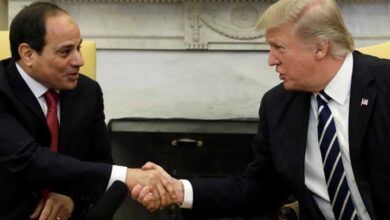“Egypt is Back!” wrote activist Shahir George on his Facebook page on 29 April, the day news broke that rival Palestinian factions Hamas and Fatah were to sign a reconciliation accord brokered by Cairo.
“One of the great achievements of this revolution is the reconciliation between Fatah and Hamas!” George continued, asserting that Egypt is “back” to a strong foreign policy directed by national, rather than the ruling party’s, interests. In reality, though, a host of factors contributed to the success of the reconciliation agreement.
Since the Palestinian unity government of 2007 failed, Egypt has tried to mediate the tensions between the two lead factions. Its proposed deal, dubbed “the Egyptian Paper”, was subject to reservations, particularly from Hamas.
Those reservations are now treated as minor details, while more significant factors prompt Palestinian leaders to get together and act in unity.
“I think the main reason why the reconciliation is happening is the national interest of the Palestinian people,” says Barakat al-Farra, ambassador of the Palestinian National Authority to Egypt.
Farra says that the Arab revolutions throughout the region have put extra pressure on the Palestinians, specifically the recent fall of the Egyptian regime and the potential fall of the Syrian regime.
“Fatah lost its main supporting regime in the region, namely Egypt, and Hamas is losing Syria as a stronghold,” says Tarek Fahmy, an expert at the National Center for Middle East Studies who participates in the negotiations.
With unrest rocking Syria, the traditional home for Hamas’s leadership in exile, reports have hinted that the group may relocate to Qatar, another regional mediator.
The regime change in Egypt may also have played a role in the successful reconciliation, namely a revamped Egyptian foreign policy that deviates from the traditional passivity of former President Hosni Mubarak's regime. Some in the media have suggested that the deal’s success was due to the departure of Omar Suleiman, Mubarak’s intelligence chief, who was at the forefront of Egyptian mediation in Palestinian and Israeli affairs.
Fahmy also claims that the change of foreign minister isn’t responsible for the success of the talks.
“The reconciliation file remains primarily an intelligence file. The foreign ministry is only a collaborator," Fahmy says.
Palestinians, though, have had their own uprising of sorts, voicing anger at the ruling regimes and calling for an end to the division between the factions.
“The 15 March movement and the call for the end of divisions that took form inside and outside of Palestine had an important role to play,” Farra says.
“End the Division” is a youth-led campaign that took to the streets of the West Bank and Gaza, as well as refugee camps in neighboring countries, on 15 March this year. The extent to which this popular awakening, inspired by neighboring Arab revolutions, exerts pressure on the Palestinian leadership remains unclear.
Another factor that could have pushed the deal forward is that the leadership of both factions is growing old, says Fahmy. A younger generation is emerging within the factions that opposes divisions.
The reconciliation accord, to be formally announced on Wednesday in Cairo, stipulates the formation of a national unity technocratic government and the holding of Legislative Council elections within a year of the agreement’s signature. The agreement also stipulates the unification of the Palestinian National Authority’s institutions in Gaza and the West Bank and the rebuilding of Gaza.
Previously, Hamas had a series of reservations on the document brokered by Egypt.
“Egypt was so determined for its proposed paper to be signed, while Hamas felt that the Egyptian proposition should not be the Quran of the reconciliation,” says Fahmy.
Reservations mainly pertained to the question of political prisoners held by both factions and the management of the legislative elections process, among other issues.
“But now the general mood is ‘let’s sign and then talk,’” he says.
The discourse on the revival of the Palestinian Liberation Organization (PLO), the body that signed the Oslo Accords with Israel in 1994 and the historic umbrella institution of the Palestinian people, is also at the heart of the reconciliation process between Hamas and Fatah. The popular call, currently considered by both Hamas and Fatah, is for the re-election of the Palestinian National Council (PNC), which legitimizes the PLO and which was brought to a halt for many years.
The election of the national council would require sharing the seats between the two main factions. The popular demand, however, is to extend the election to outside the West Bank and Gaza and to include 1948 Palestinians and the Palestinian Diaspora in a quest for inclusive representation.
“The call for PNC elections unifies every Palestinian because it rises above faction, ideology and political orientation,” Karma Nabulsi, an Oxford academic and a former PLO representative, writes in The Guardian.
Nabulsi adds that an inclusive PNC election is the main guarantor of Palestinian unity, which cannot be achieved through a Palestinian Authority presidential election, legislative elections in the West Bank and Gaza, or just the reconciliation between Fatah and Hamas.
Israel has announced its rejection of this rapprochement. Israeli Prime Minister Benjamin Netanyahu said that the Palestinian Authority must choose between making peace with Israel and making peace with Hamas. On Sunday, Israel announced it would withhold a US$89 million cash transfer to the Palestinian Authority in an attempt to pressure it to abandon the agreement.
“The test for Egypt is how much it will put up with Israeli pressure and manage to move the reconciliation forward,” Fahmy says.




